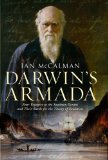Summary | Excerpt | Reviews | Beyond the book | Read-Alikes | Genres & Themes | Author Bio

A Life in Poems
by Ruth PadelPoet Ruth Padel divides Darwin: A Life in Poems into five chapters, one for each discrete stage of the scientist's life. Chapter Two, which addresses his travels on the H.M.S. Beagle, pulsates with rich, sensuous imagery that echoes Darwin's enchantment with the natural world. While exploring a Brazilian rainforest, for example, Darwin has an arboreal revelation: "Bristles of orchid leaves on every black branch/like green flames over Bibles./Botanical forms gyrate and pour/through rivers of otherworld bark/and a wrestling musculature of pure/live wood." Far from diminishing his reverence for nature, his burgeoning belief in evolution opens vistas as immense as the sparsely populated American prairies that the Lewis and Clark Expedition had mapped not long before the voyage of the Beagle.
Darwin covers its subject's life not only as a scientist but also as a devoted husband and father, and these poems in the collection prove equally resplendent and moving. In "He Ignores His Father's Advice," the renegade geologist metamorphoses into a shy yet determined suitor as he proposes to Emma. The advice that he ignores is to keep his religious doubts secret from his wife-to-be; Darwin, however, believes in totally honesty, and although his agnosticism pains Emma, she sublimates her concern for his spiritual welfare to her love for him. "How Do Species Recognize Their Mate?" even frames natural selection in the context of a beautiful, unsentimental love poem. Despite the vast differences in their approaches to faith, Charles and Emma Darwin's love sustains them both through a series of difficult pregnancies, Darwin's poor health, and the death of their daughter Annie at age ten. This last occurrence in particular haunted Darwin, as he feared that marrying his first cousin may have doomed Annie to become an example of his own doctrine, "survival of the fittest."
Most scholars agree that Annie's death in 1851 had a profound impact on solidifying Darwin's religious doubts and in giving him the courage to publish ever bolder accounts of evolution that challenged the prevailing notions of "intellectual design." In "Salting the Seeds," Padel hints at this in the lines "Dawn fog dissolves/among the medlars into a wraith/you see, then lose, in the shape/of a running girl." While Darwin clearly adored his other children (Padel deftly incorporates their loving recollections of him into the later poems), he admits that Annie was his favorite, and the poems in the final section of the book all carry a sense of resigned melancholy despite the fact that he published his scientific theories to great recognition during this period. Padel's empathy with Darwin (she is incidentally his great, great granddaughter) along with her literary gifts result in a powerful portrait of a man whose ideas have revolutionized the way that we view the world.
![]() This review
first ran in the October 17, 2012
issue of BookBrowse Recommends.
This review
first ran in the October 17, 2012
issue of BookBrowse Recommends.

If you liked Darwin, try these:

by Iain McCalman
Published 2010
Darwin's Armada tells the stories of Charles Darwin, Thomas Huxley, Joseph Hooker and Alfred Wallace, four young amateur naturalists from Britain who voyaged to the southern hemisphere during the first half of the nineteenth century in search of adventure and scientific fame.

by Tracy Chevalier
Published 2010
A voyage of discoveries, a meeting of two remarkable women, and an extraordinary time and place enrich bestselling author Tracy Chevalier's enthralling new novel.
Your guide toexceptional books
BookBrowse seeks out and recommends the best in contemporary fiction and nonfiction—books that not only engage and entertain but also deepen our understanding of ourselves and the world around us.